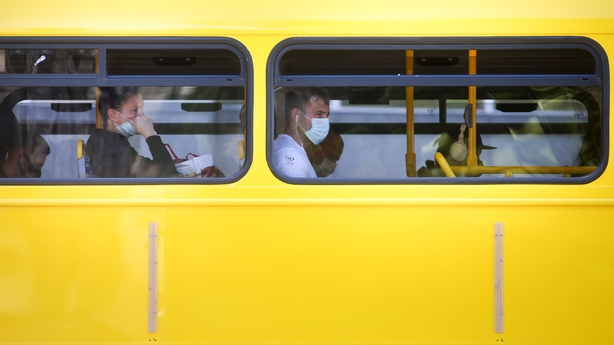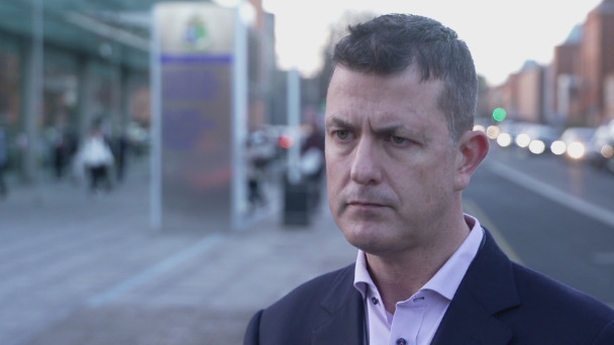Chief Medical Officer Professor Breda Smyth has warned that Ireland is "in the eye of a respiratory virus storm as we enter the Christmas period".
Speaking on RTÉ's News At One, Prof Breda Smyth said 120 cases of Covid-19 were diagnosed in hospitals around the country overnight.
"And we have 19 cases in ICU and this increased significantly over the last seven days," she added.
Prof Smith said there has been a 75% increase in flu cases and a 35% increase in hospitalisations.
She said both Covid and flu are circulating at the same time this winter, giving rise to significant morbidity.
Prof Smith said those in hospital with flu are predominantly over 65 years of age, but there has been a 65% increase in hospitalised children aged five to 14.
The CMO described as "concerning" the increase in the number of people being admitted to hospital with Covid over the last seven days.
She also said there had been a fall-off in the uptake of boosters and she urged those who are eligible to come forward, adding that the booster is very effective against the Omicron variant.
"We do know that in our winter booster programme for Covid, it's the adapted vaccine that has part of the Wuhan strain but also the Omicron strain, so it's very effective against the Omicron virus," she said.
"So I would urge anyone who hasn't already, to received their booster, that is eligible for a booster, that they would come forward."
Prof Smyth said an early launch of the flu vaccination programme has led to "a very good uptake" in over 65s, with 73% of that age group now vaccinated.
Prof Smyth said anti-viral treatments are recommended for those who are at highest risk of Covid, including those who are in high-risk groups for serious illness, are immune-compromised, are not fully vaccinated and are over 65 and those who are over 75 that are fully vaccinated.
She said people in those categories who experience Covid symptoms should be assessed by a medical practitioner for their eligibility for anti-viral treatment.
"It is important that we use all the tools that we have in the toolbox to help us to respond to this challenge with regards to flu and Covid," she said.
Prof Smyth yesterday appealed to people to stay at home if they have flu-like symptoms and not to attend Christmas parties or meet family if they have new Covid-like symptoms.

She also appealed to people to wear masks on public transport, which was echoed this morning by the HSE's Chief Clinical Officer Dr Colm Henry.
As well as public transport, Dr Henry urged people to wear masks in "any setting where there is any degree of congestion and where they are in the company of an older person".
There has been a "significant and alarming rise" in cases and hospitalisations of Covid-19 and influenza in Ireland, he added.
Speaking on RTÉ's Morning Ireland, Dr Henry said Covid cases are up 75% in one week, while hospitalisations are up 90% since the beginning of December.
At the same time, influenza cases are up 75% in one week, and hospitalisations up 35%.
Dr Henry said the country is seeing "a significant rise, albeit from a low base of patients admitted to ICU", adding that there has been a peak in respiratory syncytial virus (RSV) cases.
"That's a five-year high that has caused sustained pressure on our paediatric hospitals," he said.
Dr Henry added they are seeing "end-to-end system pressure, not just on hospitals, but on general practice too".
On vaccination for Covid-19, Dr Henry said it affords good protection from serious illness, but there is "weaning uptake" of the jab, which he said is a concern.
The HSE's Chief Operations Officer Damien McCallion said that Ireland is dealing with a "triple wave of viruses," adding that yesterday's figures were 250 children in hospital with RSV, 600 people are in hospital with Covid and 300 patients have influenza.
We need your consent to load this rte-player contentWe use rte-player to manage extra content that can set cookies on your device and collect data about your activity. Please review their details and accept them to load the content.Manage Preferences
The General Secretary of the Irish Nurses and Midwives Organisation has said patients cannot now be guaranteed any level of safe care in public hospitals due to the current levels of overcrowding.
Figures collated by the Irish Nurses and Midwives Organisation show that just over 118,000 patients have been without a hospital bed so far in 2022, making it the worst year for hospital overcrowding on record.
Phil Ní Sheaghdha warned that public hospitals are unsafe due to the long waiting times for patients who attend and called for the utilisation of private hospitals, similar to the measures implemented at the start of the pandemic.
"It's extraordinarily bad. I don't think we've ever seen it as bad as it is now," she told RTÉ's Drivetime, adding that the situation is likely to worsen next week and into early January due to the increasing incidence of flu.
The Mater Hospital in Dublin is among the hospitals around the country under "extreme pressure" due to the surge in cases of Covid-19 and influenza.

Dr Gerard O'Connor, a consultant in emergency medicine at the Mater, said in the adult hospitals the increase in the cases, which are the dominant viral infections, has "translated into a surge of patients who are critically unwell with Covid-19 and influenza A."
Dr O'Connor said: "If you'd asked me a couple of weeks ago, we had less than ten patients who were critically unwell with Covid-19 and influenza A, but earlier this week that figure came close to 90 patients in the hospital with Covid-19 with influenza A."
The Mater Hospital this week appealed to people to avoid its emergency department, where possible, with a temporary restriction on visiting in the hospital being introduced.
Dr O'Connor said: "Unfortunately, if your condition is non-urgent, you may be waiting a very prolonged period of time to be seen and we obviously apologise for that."
He said the ED remains open for patients "with very urgent, very life-threatening, very critical emergencies."
He said the health service is "extremely fragile" and an "extraordinary effort" by staff has been required for many months up to now, adding that everyone must play their part in supporting staff get through the coming weeks.
"We, the public, need to get our flu and Covid-19 vaccines, to protect ourselves, others and the health service from potential surges from these viruses," he said.
"If you need urgent help, then our health service is here for you, but we do need to use it wisely; and I ask everyone to work with hospital teams to support the discharge of your relatives when their medical care is complete.
"I cannot recall a time when concerns across the health and social care system were at this level.
"This winter will be about providing the best care we can, minimising harm and supporting staff while yet again they take the strain.
"We also need sustained action for the longer-term including recurrent, significant investment and greater reconfiguration of services. Patients and staff will keep paying the price if this does not happen."
Additional reporting by PA